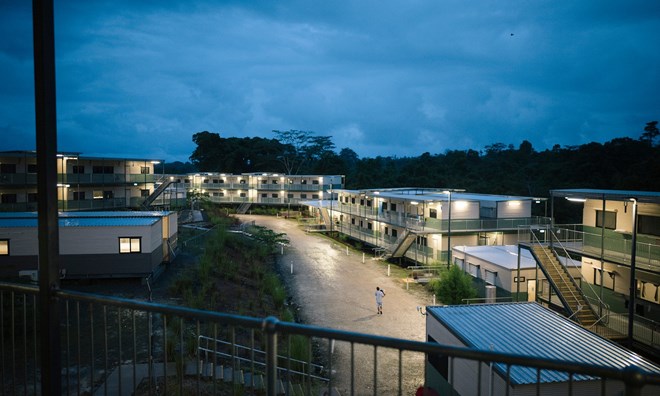
Tuesday, October 11, 2016
Refugee agency representatives to meet with immigration officials after UN’s leaked report says condition on Manus ‘equivalent to a maximum security prison’

Accommodation at the regional transit centre on Manus Island in Papua New Guinea, where the United Nations has described conditions as ‘equivalent to a maximum security prison in Australia’. Photograph: Matthew Abbott/GetUp
Representatives of the United Nations refugee agency and medical experts will meet with immigration department officials Tuesday to urge the end of Australia’s offshore detention regime – as both island camps remain riven by violence and abuses.
On Saturday on Manus Island, Somali refugee Masoud Ali Sheikh was attacked by a gang of local men, who threw rocks at his head, leaving him bleeding and scarred. The attack follows a number of assaults on refugees on Manus Island.
In August, the Guardian published a massive trove of incident reports – redacted to protect identities – that revealed systemic physical and sexual violence committed against those in offshore detention on Nauru, in particular women and children. The Nauru Files showed, too, that those detained on the island suffer extreme rates of mental harm caused by detention, and commit self-harm and attempt suicide at endemic rates.
The UNHCR conducts regular inspection visits of offshore detention camps and provides reports of those inspections to government. It meets regularly with senior government officials.
However, details of the UNHCR’s reports usually remain private.
This time, however, key details of reports have been leaked to the media, and the meeting comes as Australia’s offshore policy has been placed under immense domestic and international pressure.
The Saturday Paper carried details of the UNHCR’s reports on Nauru and Manus, which reportedly say the conditions on Manus are “equivalent to a maximum security prison in Australia”.
The report on Nauru says: “It appears that PTSD and depression have reached epidemic proportions ... UNHCR anticipates that mental illness, distress and suicide will continue to escalate in the immediate and foreseeable future.”
Labor senator Lisa Singh said this week’s meeting between UNHCR and government officials was an opportunity for the Australian government to change its poor standing on refugee policy.
“Australia’s treatment of offshore detained refugees is regarded as cruel and inhumane, and is costing more than $570,000 per year, per refugee,” she said.
“Leaked information regarding refugees detained on Nauru, including women and children, has revealed they are being subjected to physical, mental and sexual abuse and are self-harming.
Advertisement
“The government has a duty of care to protect refugees from harm, not cause them further harm through indefinite detention.”
Singh, currently on secondment at the United Nations, said mandatory, indefinite detention was not the answer to an effective immigration policy.
“The flow of asylum-seeker vessels into Australia has virtually ceased due to the turnback policy. So if the government cannot find appropriate third country settlement options, there is no longer any reason why it cannot end their suffering and bring them to Australia.”
On Saturday, 27-year-old Somali refugee Masoud Ali Shiekh was attacked by a group of local men on Manus Island as he walked to a bus stop near the refugee transit centre in Lorengau on Manus. The men threw rocks at Sheikh, one of which gashed his forehead deeply.
Shiekh fled war-torn Somalia with his family in the early 90s, and formerly worked with the United Nations refugee agency and Save the Children in Yemen before being forced to flee again after receiving death threats from a criminal gang.
Behrouz Boochani, an Iranian refugee also detained on Manus, told the Guardian there was no real prospect the 900 refugees held on Manus could be resettled there.
“I don’t want to make any judgment about local people and their culture because they are victims like us. But it’s clear that Manussian people don’t want refugees to settle in their community. The Australian government exiled us by force to this island and wants to settle us in the local community by force. The local people don’t want to accept us in their community because their culture is a tribal system [and] it’s clear that their community does not have the capacity to accept us.”
Boochani said the men on Manus were fearful about their futures and did not trust the Australian government after more than three years in detention.
“It is a very strange situation. On one side local people don’t want to accept refugees and cannot because of important and logical reasons (both economic and cultural). On the other side the refugees don’t want to live in PNG and cannot because it is not safe and not viable for us. Who is guilty? The Australian government. Who is responsible? Australia.”